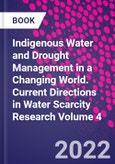Indigenous Water and Drought Management in a Changing World presents a series of global case studies that examine how different Indigenous groups are dealing with various water management challenges and finding creative and culturally specific ways of developing solutions to these challenges. With contributions from Indigenous and non-Indigenous academics, scientists, and water management experts, this volume provides an overview of key water management challenges specific to Indigenous peoples, proposes possible policy solutions both at the international and national levels, and outlines culturally relevant tools for assessing vulnerability and building capacity.
In recent decades, global climate change (particularly drought) has brought about additional water management challenges, especially in drought-prone regions where increasing average temperatures and diminishing precipitation are leading to water crises. Because their livelihoods are often dependent on the land and water, Indigenous groups native to those regions have direct insights into the localized impacts of global environmental change, and are increasingly developing their own adaptation and mitigation strategies and solutions based on local Indigenous knowledge (IK). Many Indigenous groups around the globe are also faced with mounting pressure from extractive industries like mining and forestry, which further threaten their water resources. The various cases presented in Indigenous Water and Drought Management in a Changing World provide much-needed insights into the particular issues faced by Indigenous peoples in preserving their water resources, as well as actionable information that can inform future scientific research and policymaking aimed at developing more integrated, region-specific, and culturally relevant solutions to these critical challenges.
�
Please Note: This is an On Demand product, delivery may take up to 11 working days after payment has been received.
Table of Contents
1. The Need for Indigenous Knowledge-Based Environmental Policy in a Changing World
Miguel Sioui
2. Striving Towards Reconciliation through the Co-Creation of Water Research
Dawn Martin-Hill, Colin M. Gibson, Charles-Fran�ois de Lannoy, Danielle Gendron, Kathryn Chen, Denise McQueen, Makasa Looking Horse, Clynt King, Hannah Grewal, Tariq A. Deen, Sawsan Makhdoom, Patricia Chow-Fraser, Emil Sekerinski, P. Ravi Selvaganapathy, M. Altaf Arain
3. Reasserting Traditional Knowledge Across a Fragmented Governance Landscape: The Mackenzie River Basin
Alex Latta
4. Haudenosaunee Women's Water Law: Reclaiming the Sacred
Dawn Martin-Hill, Beverly Jacobs, Nidhi Nagabhatla, Sarah Duignan, Rohini Patel, Stephanie Pangowish
5. "We had to Jump Over, but We're Still Here�: Nimiip�u Spatio-Temporalities of Water and Fish in Times of Climate Change
Teresa Cavazos Cohn, Sierra Higheagle, Kyle Powys Whyte, Kate Berry, Kristin Green, Marcie Carter
6. "The Evolving Relationship between Maya Communities and Subterranean Waters in the Yucatan Peninsula�
Derek A. Smith, Miguel Sioui
7. Rights to Water and Water's Rights: Plural Water Governances in Mining Context of Colombia and Peru
Astrid Ulloa, Gerardo Damonte, Catalina Quiroga, Diego Navarro
8. From the muddy banks of the Watu: the Krenak and the Rio Doce mining disaster in Brazil
Andr�a Zhouri, Walison Vasconcelos Pascoal
9. "Guides of water�: Indigenous water justice and pastoral management beyond adaptation to climate change
Julian S. Yates
10. Contested waters, extractivisms and territories: Indigenous people in Chile and the neoliberal crisis
Hugo Romero-Toledo, Katy Jenkins
11. Indigenous Knowledge Systems for the management of the Barotse Flood Plain in Zambia and its implications for policy and practice in the developing world
Everisto Mapedza, Tambudzai Rashirayi, Xueliang Cai, Alemseged Tamiru Haile, Barbara van Koppen, Mukelabai Ndiyoi and Sonali Senaratna Sellamuttu
12. Indigenous Knowledge Perspectives on Water Management and its Challenges in South Africa
Bongani Ncube
13. Hydro-Social Cohesion in Iranian Local Communities
Majid Labbaf Khaneiki
14. Rapua nga tohu (seeking the signs) - Indigenous knowledge informed climate adaptation
Harcourt Nikki, Awatere Shaun
15. Indigenous Knowledge, Mercury and a Remote Russian Indigenous River Basin
Ponoi River
Tero Mustonen
16. Indigenous Community Engagement at Scotty Creek, Northwest Territories, Canada: Experiences and Lessons learned
William Quinton, Ramona Pearson, Miguel Sioui








